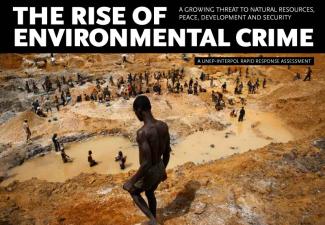Ecology
Global hazard

According to the UN Environment Programme and Interpol, mafia organisations that are involved in environmental crime operate like multinational corporations. They are well equipped, rely on solid information and operate in a manner that is both focused and flexible. Moreover, they are proficient in white-collar crime such as tax fraud, double counting, transfer mispricing and money laundering, internet crime (including hacking and phishing/identity theft), securities fraud and financial crime. They create shell companies, use tax havens and fraudulently claim carbon credits.
UNEP and Interpol estimate that natural resources worth up to $ 258 billion are being stolen and destroyed annually by timber mafias, wildlife poachers and traffickers, illegal miners and hazardous waste dumpers. The authors estimate that the damage done is increasing two to three times faster than the world economy is growing. Transnational crime organisations are said to be powerful and well-coordinated. They bribe, threaten, coerce, intimidate and kill.
The report suggests that centralised and coordinated efforts are needed both at national and international levels (see comment by Erik Solheim). It recommends coordinated and centralised action by government agencies at national and international levels, but it also wants consumer awareness to grow.
The authors point out that environmental crime is linked to poor governance, as is evident in corruption, inadequate law enforcement and weak judicial systems. African and Asian governments are called upon to raise their budgets for police, prosecution and courts. Political interference, weak legislation and low employee morale are also said to facilitate environmental crime.
The report estimates that forestry crimes amount to damages worth up to $ 150 billion and illegal fishing up to $ 24 billion. Illegal exploitation of mining may cost humankind up to $ 50 billion.
Environmental crime, moreover, must be seen in the context of security. The report stresses that non-state armed groups rely on it for funding. It is well known, for instance, that the Taliban are mining lapislazuli and minerals besides patronising timber mafias in Afghanistan and Pakistan. According to the UNEP/Interpol report, moreover, the looting of natural resources has been the primary driver of violent conflict in the Democratic Republic of the Congo (DRC) for nearly 20 years. The sale of diamonds, gold and precious stones has similarly fuelled civil strife in various African countries, and Al Shabaab is benefitting from the illegal and environmentally destructive charcoal business in Somalia.
Violent conflicts terrorise societies and force millions of people to flee from their homes. In the eyes of the report authors, the public must become aware of the links between environmental crime and international terrorism as that will foster a sense of urgency. So far, too many people, especially in rich western nations, do not understand that more is at stake than the poaching of elephants, rhinos and lions, for example. They need to know that environmental crime is a threat to security and peace.
That said, the conventional understanding of environmental crime is relevant too. Poaching and illegal logging are unacceptable – and so is the marketing of products that result from these practices around the world.
Ceciel Shiraz Raj
Link
UNEP and Interpol, 2016: The rise of environmental crime.
http://unep.org/documents/itw/environmental_crimes.pdf












